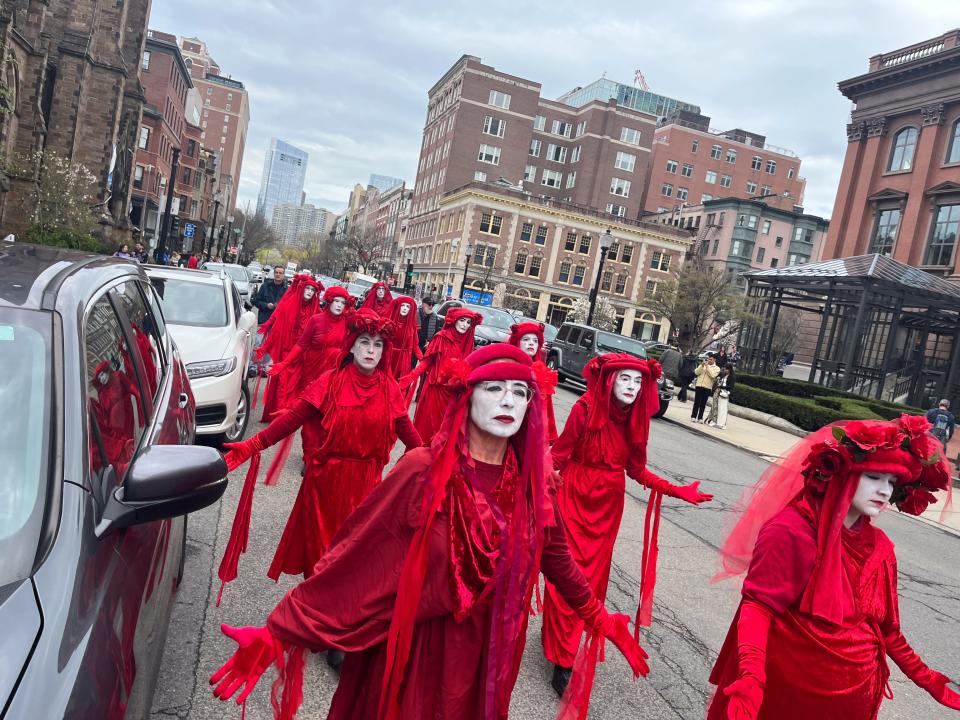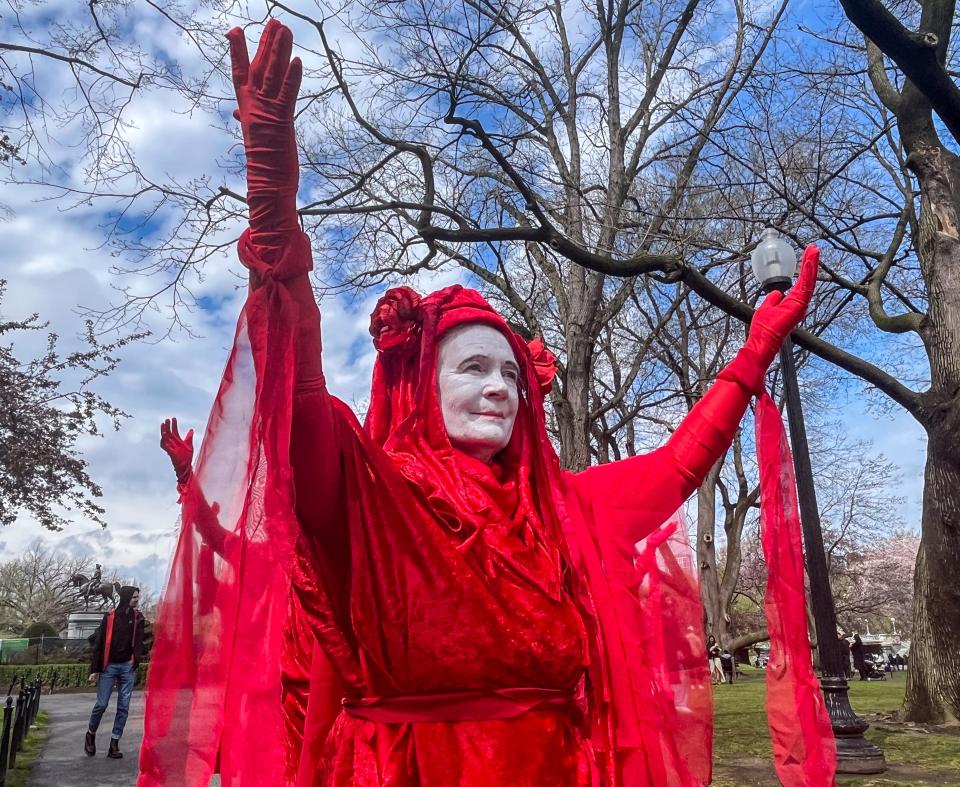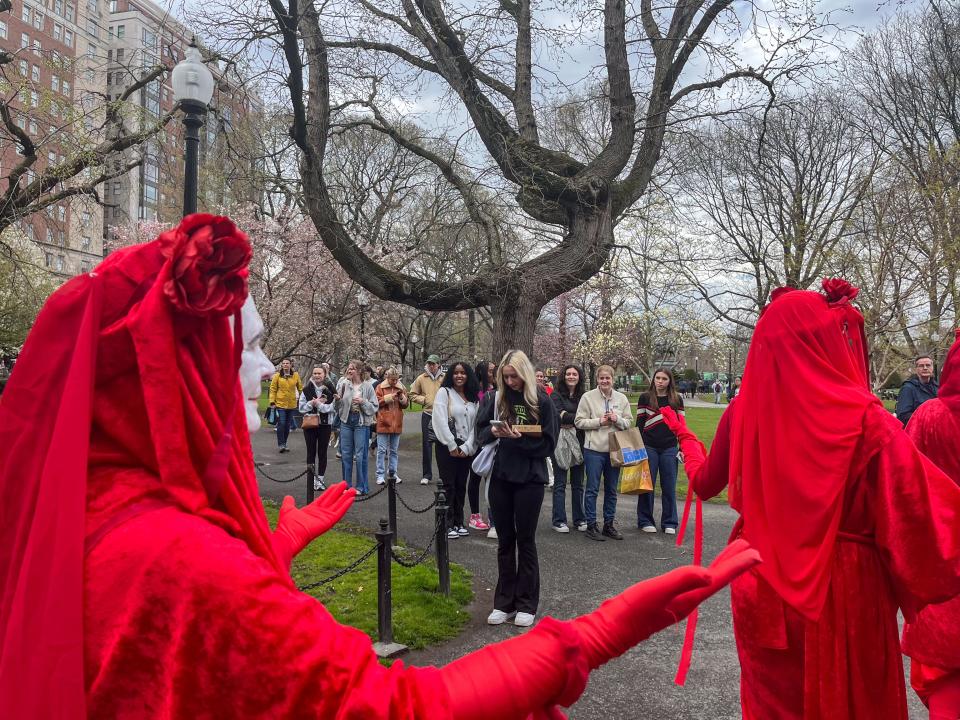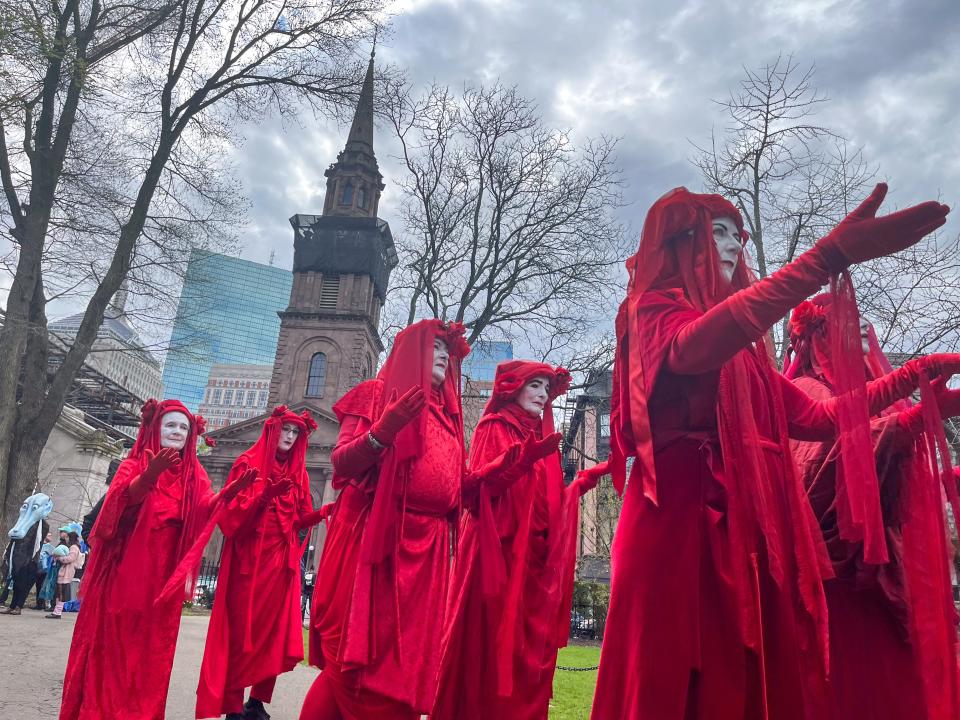For these older MetroWest activists, climate change requires more than petitions, letters
BOSTON — Earth Day came early for Peter Watson and Jenny Allen.
The longtime environmentalists took active roles in dramatic demonstrations before the official April 22 holiday. Watson, 80, and Allen, 76, both have decadeslong personal histories with activism, but each experienced a "first" on Earth Day weekend.
Watson, of Wellesley, had never before been arrested at a protest. And Allen, of Framingham, took on a new role in the international “red rebel” brigade.
The pair are part of a network of local and international environmental advocacy groups who aim to utilize diversity in age and strategy to convey their message and prevent climate disaster.

Salute to the planet: Earth Day is April 22. Here's what to know
Human-induced global warming has begun to cause “increasingly dangerous impacts on nature and people in every region of the world,” according to a 2023 report by the United Nations Intergovernmental Panel on Climate Change.
“Writing petitions and sending in letters and stuff like that — it's not worked on its own," Watson said. "It's always needed something that is more visible — more artistic, more creative. That kind of activism, I enjoy. It feels like I’m doing something.”
Peter Watson among 20 people arrested at Hanscom Field protest
On the morning of April 20, Watson and others occupied the tarmac at Hanscom Field in Bedford. They were protesting a proposal to create 17 new storage units for private jets, which produce heavy emissions of carbon dioxide.
Their demonstration caused the airport to briefly close. Police arrested 20 protesters, including Watson, charging them with trespassing and disorderly conduct.
Watson was proud to take part in the action, which made headlines.
“I’ve been on the fringes of some civil disobedience protests before, but not right in the middle like this time,” he said. “I felt, ‘OK, I just graduated.’”

A day later, Allen and other costumed activists marched through Boston Common and down Newbury Street, occasionally disrupting traffic, as part of a “funeral for nature.”
Some protesters dressed as seahorses, one wore a polar bear suit and another came in a mermaid costume. Many shouted chants like, “What do we want? Climate justice! When do we want it? Now!”
But Allen and other “red rebels” marched and danced silently in white face paint and scarlet robes. Allen had previously protested alongside this collective of performance artists, but this was her debut as part of the show.
Allen said mourning the planet felt “natural” for her.
“I expressed more climate grief than I ever have before,” she said.
Extinction Rebellion uses disruptive methods to protest climate change
Both the Hanscom Field and Newbury Street demonstrations were organized in part by the climate activist group Extinction Rebellion.
Extinction Rebellion, or XR, has chapters throughout the globe — including one in Boston — which use dramatic and sometimes disruptive methods to call attention to climate change and advocate for environmental protections.
In the United Kingdom, where Extinction Rebellion was founded in 2018, protests have shut down traffic and a commuter rail line. At the Massachusetts State House, Extinction Rebellion members hosted a “basketball game” outside Gov. Maura Healey's office and mooned legislators from the Senate gallery.
Critics say the group's tactics alienate people who might otherwise be supportive of environmental justice.
Jamie McGonagill, Extinction Rebellion Boston’s media and messaging director, said she understands their concerns, but “we have reached a point as a planet” where such strategies are necessary.
“It's always going to be a little awkward and a little embarrassing to be among the first ones to take really dramatic actions,” McGonagill said. “But if somebody doesn't look a little bit goofy, nothing is ever going to change.”

'More people interested': Are electric cars the answer to high gas prices? Inventory is a challenge
University of Massachusetts Amherst professor Ezra Markowitz researches the psychology and communication practices of environmentalism. He said there’s ongoing debate about what methods are most useful in tackling the climate crisis because different researchers have varying definitions of success.
Some measure progress as increasing awareness, while others look for changes in legislation or higher public turn-out at local meetings.
“It’s part of people coming at the same question from different perspectives,” Markowitz said. “They're also looking at different outcomes.”
But he also said historically effective social movements often include “multi-method, multi-approach or multidimensional” tactics.
“We live in a really diverse, pluralistic society,” Markowitz said. “There's no single message that's going to resonate with everyone and make some sort of light bulb go off for society.”
Watson, Allen were drawn to theatrical nature of Extinction Rebellion
For Watson and Allen, the theatrical nature of Extinction Rebellion felt inviting.
Before retiring, Watson worked in lighting and set design for theater productions. He said Extinction Rebellion gave him the space to “return to that kind of work.”
Watson helps organize the group’s daily presence outside the State House, although he said he hasn’t participated in its more disruptive demonstrations. Instead, he and a rotating group of other protesters stand quietly outside the building’s entrance and pass out fliers.
Watson said their goal is to “constantly remind” state leaders of Extinction Rebellion Boston’s primary demand: no new fossil fuel infrastructure in Massachusetts.
“I think of it as being like a stone in the shoe — it's an irritant,” he said. “We're not going to take the stone out of the shoe until something is done.”

Watson gets to express his creative side by designing postcards to send to Healey’s office, pleading the administration to do more to protect the environment.
During Healey’s first year as governor, she appointed Massachusetts’ first climate chief and tripled the state’s Clean Energy Center budget. But Extinction Rebellion’s policy demands include further action, including the declaration of a statewide climate emergency and the creation of a citizens' assembly on ecological justice.
Allen decided to join Extinction Rebellion Boston after seeing images on Facebook of red rebels taking the streets in her hometown of Bristol, England.
“The whole aesthetic of it just grabbed me,” she said. “It just felt so familiar.”
'You do get to a certain point... and say, 'Where is my purpose?''
Allen also participates in activism organized by other groups. Third Act is a national organization of people 60 years and older dedicated to voter empowerment and environmental protections.
Patricia Weinmann, a Third Act Massachusetts chapter coordinator, said older activists have essential resources for the climate movement: time, expertise, wisdom “and a love of this planet and the people on it.”
“You do get to a certain point where you look at your life and say, ‘Where is my purpose?’” Weinmann said. “I can complain all I want when I read the news — or when the weather is 100 degrees for eight days in a row in the summer — but what am I doing?”
Another group, 350 — named for the concentration of carbon dioxide in the atmosphere considered the safe limit to avoid the worst impacts of climate change — hosts weekly protests outside of Chase Bank in Framingham to increase awareness toward the financial institution’s investments in oil, coal and gas.
'Thrilled to open our doors': Chase Bank opens first MetroWest branch office in Framingham
Allen stands with a small group outside the bank on Saturdays. She hopes the protests can “snap people out of their humdrum life.”
“I would hope they would start thinking more about climate change, and maybe reading more or listening more — and maybe changing their bank,” Allen said. “But I think it's more hoping that they will stop suppressing uncomfortable knowledge.”
Watson said it can feel hopeless trying to address an issue that “is constantly being forgotten about.”
“You’re trying to do something that you already know is virtually impossible,” he said.
Allen’s young grandchildren inspire her to keep trying.
“You start imagining the kind of world they'll be growing up in,” she said. “It just feels like a huge responsibility to do everything you can without going nuts.”
Markowitz and other researchers found that protecting the next generation’s future can be a powerful and unifying motivation for climate action.

Watson is unsure whether he’ll have grandchildren, due to his family’s environmental concerns.
“My own daughter, who is in her 30s, has decided because of climate change to not have children,” Watson said. “She doesn't want them to be in a world that is that broken — or that will be that broken unless things drastically change.”
Both Watson and Allen say it’s easy to feel dread and despair when facing today’s environmental reality, but that the network of climate activists around the state and the world provides an uplifting sense of community.
In Wellesley, environmentalists gather in front of Town Hall weekly, rain or shine, to celebrate "Future Fridays." The demonstration includes town residents, students from Wellesley College and people from throughout the region celebrating the environment and their desire to protect it. Similar events are held on Fridays worldwide.
Allen said sharing the burden can make the daunting task of climate activism feel “joyful.”
“Just getting together with other people who understand the gravity of the situation as much as you do, you can almost relax,” Allen said. “It's good, and it's fun — and it’s beautiful.”
This article originally appeared on MetroWest Daily News: Older MetroWest activists thrive with disruptive Extinction Rebellion

